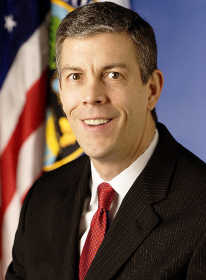Former U.S. Education Secretary Duncan at DePauw for Ubben Lecture Thursday
Arne Duncan -- the second longest-serving member of the Obama administration and described by The Washington Post as "the most powerful federal education chief in the department's history" -- will deliver the final Ubben Lecture of the school year Thursday evening at DePauw University.
Duncan's 7:30 p.m. speech in Kresge Auditorium of DePauw's Green Center for the Performing Arts (605 S. College Ave.) will be followed by a question-and-answer session. Like all Ubben Lectures, the event is free of admission charge and is open to everyone.

His topic will be "Why Our Schools Matter More than Ever."
Duncan, who served as U.S. Secretary of Education from Jan. 20, 2009 (the day Barack Obama was inaugurated) through the end of 2015, was born and raised in Chicago. His late father was a University of Chicago professor and his mother has run a South Side tutoring program for inner-city children since 1961.
As a student in Chicago, Duncan spent afternoons in his mother's tutoring program and worked there during a year off from college. He credits that experience with shaping his understanding of the challenges of urban education.
Duncan attended the University of Chicago Laboratory Schools and later Harvard University, where he graduated magna cum laude in 1987 with a degree in sociology.
Duncan was nominated to be secretary of education by President-elect Barack Obama and was confirmed by the U.S. Senate on Inauguration Day, Jan. 20, 2009. Calling him "arguably one of the most powerful education secretaries in history," The New York Times noted that Duncan "was at times the subject of criticism from both parties, angering Democrats by challenging teachers' unions and infuriating Republicans by promoting national academic standards."
In announcing Duncan's resignation, President Obama said, "He's done more to bring our educational system, sometimes kicking and screaming, into the 21st century than anyone else. America will be better off for what he has done."
In an April 2015 interview with the Education Writers Association, Duncan expressed regret that "education isn't seen as a national priority," adding that "the stakes today are so high ... Education has to be the great equalizer, it has to be the tool that helps increase social mobility."
